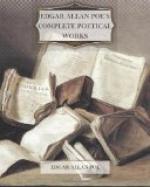“It is a wondrous thing how fleet
’Twas on those little silver feet,
With what a pretty skipping grace
It oft would challenge me the race,
And when’t had left me far away
’Twould stay, and run again, and
stay;
For it was nimbler much than hinds,
And trod as if on the four winds.
I have a garden of my own,
But so with roses overgrown,
And lilies, that you would it guess
To be a little wilderness;
And all the spring-time of the year
It only loved to be there.
Among the beds of lilies I
Have sought it oft where it should lie,
Yet could not, till itself would rise,
Find it, although before mine eyes.
For in the flaxen lilies shade
It like a bank of lilies laid;
Upon the roses it would feed
Until its lips even seemed to bleed,
And then to me ’twould boldly trip,
And print those roses on my lip,
But all its chief delight was still
With roses thus itself to fill,
And its pure virgin limbs to fold
In whitest sheets of lilies cold,
Had it lived long, it would have been
Lilies without, roses within.”
How truthful an air of lamentations hangs here upon every syllable! It pervades all. It comes over the sweet melody of the words—over the gentleness and grace which we fancy in the little maiden herself—even over the half-playful, half-petulant air with which she lingers on the beauties and good qualities of her favorite—like the cool shadow of a summer cloud over a bed of lilies and violets, “and all sweet flowers.” The whole is redolent with poetry of a very lofty order. Every line is an idea conveying either the beauty and playfulness of the fawn, or the artlessness of the maiden, or her love, or her admiration, or her grief, or the fragrance and warmth and appropriateness of the little nest-like bed of lilies and roses which the fawn devoured as it lay upon them, and could scarcely be distinguished from them by the once happy little damsel who went to seek her pet with an arch and rosy smile on her face. Consider the great variety of truthful and delicate thought in the few lines we have quoted—the wonder of the little maiden at the fleetness of her favorite—the “little silver feet”—the fawn challenging his mistress to a race with “a pretty skipping grace,” running on before, and then, with head turned back, awaiting her approach only to fly from it again—can we not distinctly perceive all these things? How exceedingly vigorous, too, is the line,
“And trod as if on the four winds!”
a vigor apparent only when we keep in mind the artless character of the speaker and the four feet of the favorite, one for each wind. Then consider the garden of “my own,” so overgrown, entangled with roses and lilies, as to be “a little wilderness”—the fawn loving to be there, and there “only”—the maiden seeking it “where it should lie”—and not being able to distinguish it from the flowers until “itself would rise”—the lying among the lilies “like a bank of lilies”—the loving to “fill itself with roses,”




